A tough test of your bond
Supporting a partner with anxiety can be challenging: Barriers rear up, communication erodes, and your relationship can suffer. One survey by the Anxiety and Depression Association of America (ADAA) found that people with generalized anxiety disorder (GAD) were twice as likely to experience one relationship issue (such as arguing) and had triple the risk of avoiding intimacy. Difficulties can spill over into finances, your professional life and the way you socialize together. You may start feeling depressed or anxious yourself. Different types of treatments are effective for treating anxiety, but a supportive partner can hugely helpful. Here’s how to assist a partner with anxiety.

Understand that anxiety is common
Everyone experiences anxiety to one degree or another at some point in their lives. Feeling anxiety is not synonymous with having an anxiety disorder. The National Institute of Mental Health (NIMH) says that in the past year about one in five U.S. adults had an anxiety disorder such as panic disorder, GAD, or post-traumatic stress disorder—PTSD. That’s more than 62 million people, and it doesn’t include everyday anxiety or stress, like trying to meet an important deadline or being stood up. Anxiety becomes a disorder when it becomes excessive and gets in the way of functioning in or enjoying your life.
Not all anxiety is harmful, either—sometimes it’s even helpful, according to the Greater Good Science Center at the University of California, Berkeley. That’s not to diminish a partner’s pain, especially if their anxiety is chronic. It just means you can reassure them (and yourself) that they’re not alone. That can help move both of you toward realistic solutions. (Here are some ways one woman found her anxiety to be helpful.)
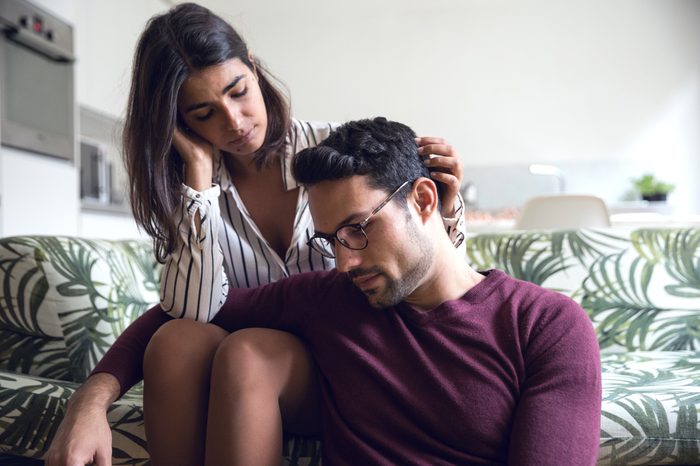
You may have to sacrifice short-term comfort for longer-term gains
Many people who experience anxiety try to directly control or squash it, which then leads to a lot of avoidance behaviors, says Jonny Gerkin, MD, associate professor of psychiatry at the University of North Carolina School of Medicine in Chapel Hill. But staying away from the things that scare your partner or exacerbate their anxiety—be it parties or airplanes—isn’t going to help your partner get better. “That becomes a tricky situation for the partner because your initial intuition is to soothe and rescue them and enable the pattern of avoidance,” says Dr. Gerkin. “It feels very compassionate, but it perpetuates a lot of the difficulties.” Instead, find ways to support the person while they confront and move through their anxieties, if that’s possible. Ask your partner what he or she would be doing if the anxiety wasn’t surging, advises Dr. Gerkin. Find out how naturally calm people avoid stress.
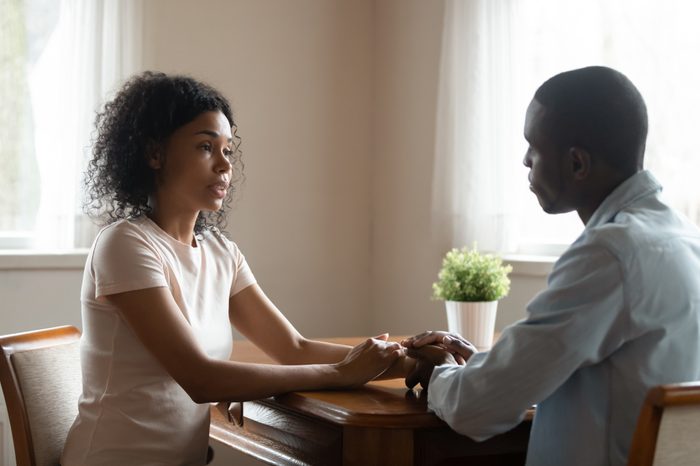
Admit what you don’t know
There are many different types of anxiety disorders: In addition to GAD, there’s panic disorder, PTSD, social phobias, specific phobias like fear of heights, obsessive-compulsive disorder (OCD), and separation anxiety disorder—to name a few. Each has its own constellation of symptoms which, to complicate things even more, vary from individual to individual. The ADAA encourages you to speak up when you don’t understand what a partner is going through. “The first step in trying to help is to become aware,” says Beverly B. Palmer, PhD, professor emeritus of psychology at California State University, Dominguez Hills and author of Love Demystified: Strategies for a Successful Love Life. (Here are things only people with anxiety will understand.)
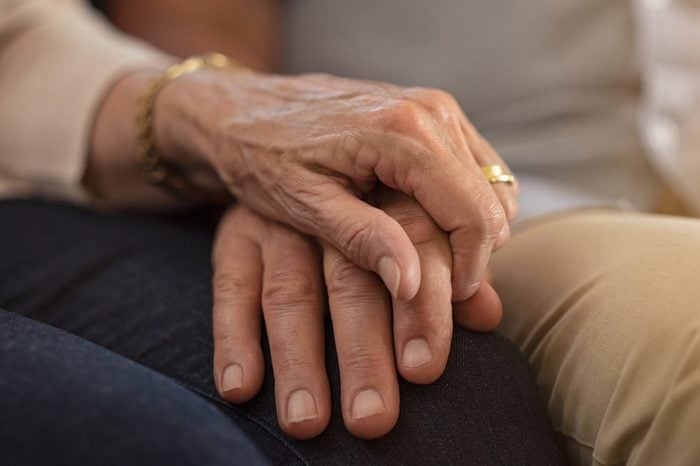
Let your partner “own” the anxiety
It’s more important for the partner with anxiety to learn to recognize when they feel anxiety rather than to rely on a partner’s (or anyone else’s) perception, says Palmer. Still, the non-anxious partner can get the ball rolling. One way is by reading and interpreting body language. “At the beginning, give a description of what you’re noticing in your partner with no adjectives,” she explains. This could be something like, “Right now, your body seems to be tensing up.” The partner may agree or disagree, but the question provides internal control over their condition. You can also suggest these phrases that help ease anxiety.
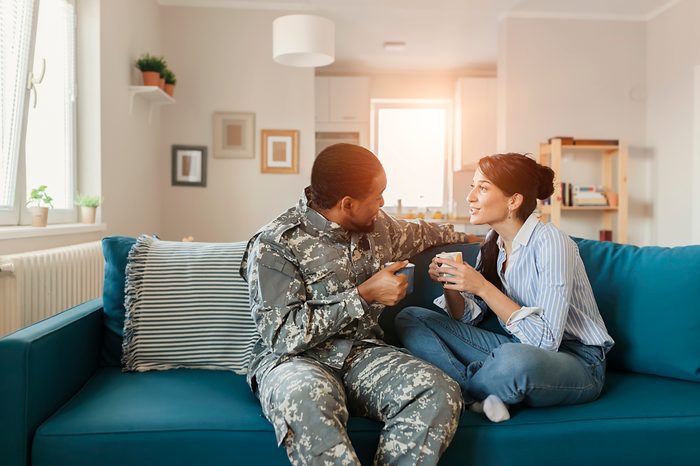
Ask your partner to describe how he or she is feeling
Asking how your partner feels can give them a little distance from their emotions—they spill fast and furious from the brain’s limbic system; your questions will engage their cortex, which governs reasoning. “It is using the executive control network to downregulate the fight-or-flight response,” says Dr. Gerkin. Remind your partner that their feelings will pass if they let them, then, he adds, “You can reengage in the present as best you can. You’re changing the function of the anxiety feelings from ‘It’s time to hide’ to ‘It’s time to take action.'” And don’t be afraid to ask how you can help, says the ADAA. (Here are 14 phrases that can help calm anxiety.)
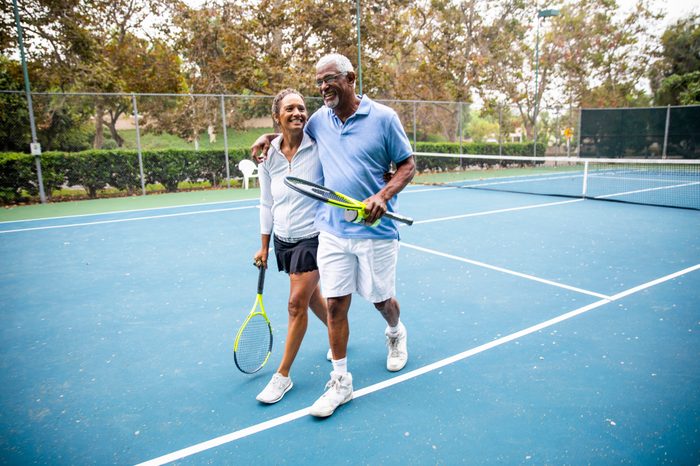
Become workout buddies
“We have a substantial body of literature that shows physical exercise really is preventive in anxiety conditions,” says Palmer. A 2017 article in Psychiatry Research, for example, concluded that exercise was an effective treatment option for anxiety and stress disorders. Of course, you’ll benefit, too, from physical activity: Become a swolemate with your partner and head to the gym or out for a walk. You could help each other, says Palmer. The Centers for Disease Control and Prevention recommends aiming for 150 minutes of activity each week.
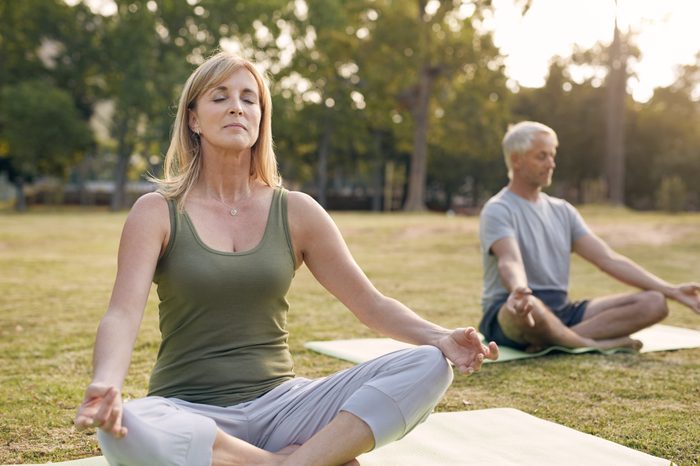
Meditate together
Like exercise, meditation or mindfulness is valuable for people with or without an anxiety disorder. “Your breath is your friend,” says Palmer. “It is so important to take a deep, slow breath in and letting it out just slowly; do that up to three times and it relaxes your body. Where your body goes, your mind goes.” One study found that meditating 13 minutes every day for eight weeks improved mood (along with attention and memory). When it comes to meditation, though, more is usually better. Try these mini meditations to reduce stress.
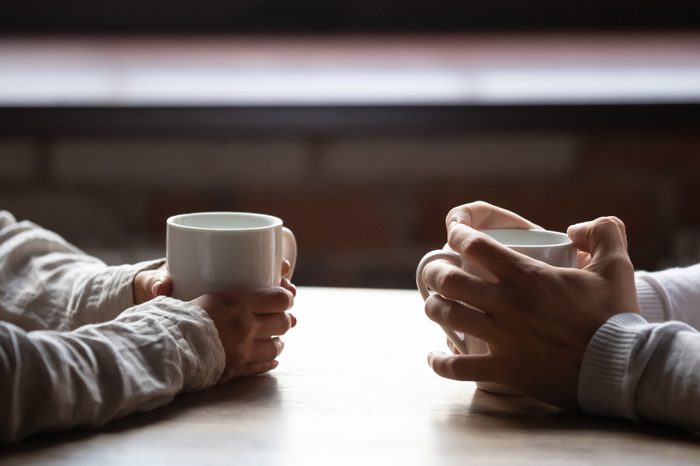
Be a good listener
Encourage your partner to tell you when he or she is feeling uneasy, counsels Palmer. “The partner can say, ‘Let me know when you’re having distressing feelings. Let me know if you wake up from an anxious dream and feel upset,'” she says. When your partner responds, listen closely. This type of dialogue may even strengthen your relationship over the long-term. (Here are 9 listening skills you should have.)

You’re not a therapist, but…
You can certainly avail yourself of therapy techniques, especially those based upon cognitive behavioral therapy (CBT). “The research literature shows that the number one treatment for anxiety is cognitive behavioral therapy and cognitive behavioral therapy is not something that only therapists can use,” says Palmer. “It’s actually a tool for anyone.” One of the first steps is to identify the early stages of anxiety by learning and identifying physical cues: “Some people may feel a certain tightness in their chest or a bit of stomach pain, but they don’t associate it with possible anxiety,” she adds. Other parts of CBT encourage practicing “realistic thinking” by being on the lookout for negative thought patterns such as “I can’t do this—I feel so nervous.” The two of you can practice replacing such thoughts with “It’s okay to feel anxious, and it doesn’t have to stop me.”
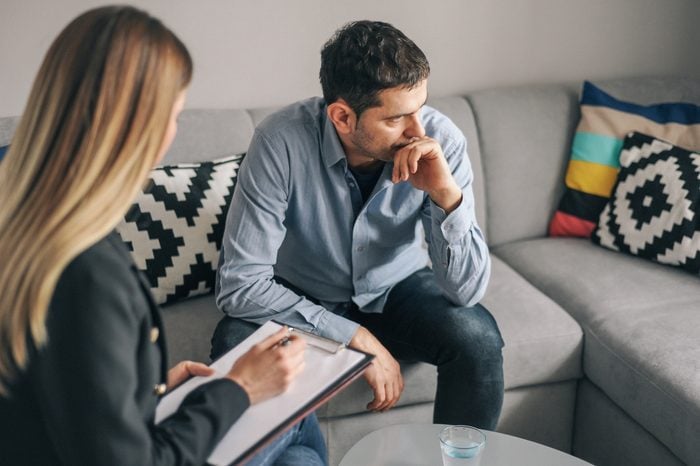
Look after yourself
This could mean finding a therapist who can train you in techniques that can support your partner—helping with assigned homework from therapy, for example, points out the ADAA. Or you could accompany your partner as they attempt to enter a situation that could trigger anxiety. Or helping your partner maintain their “behavior contract.” You may also want to consider couples therapy, which, says the ADAA, more and more mental health professionals recommend. You could get help in setting boundaries with your partner so you don’t get overwhelmed; a therapist may also encourage you to stay involved with your own hobbies, interests, career, and exercise (with or without your partner). The bottom line is you will need your own support system, as well. For more information, check out these ways to treat anxiety naturally.

